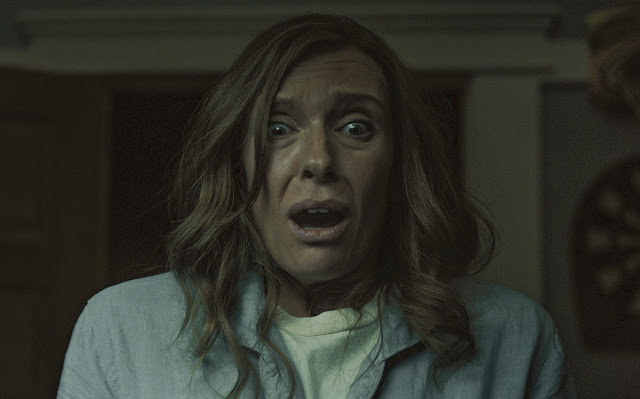Hereditary: Blu Ray Review
Blending psychological terror, a portrait of grief and some bravura directorial touches from a debuting Aster, Hereditary is currently being acclaimed as the scariest film since The Exorcist.
It's a claim which detracts from the film and which piles expectation unfairly onto the indie release - but it is pleasing to note that over the course of an extremely unsettling 2 hours, Ari Aster's debut is as exciting as it is enticing.
A tautly wound Collette plays Annie, a grieving mother who's just lost her apparently monstrous mother. As the film begins, the family is recovering post funeral, with her daughter Charlie (newcomer Shapiro) claiming to see the grandmother, and with son Peter (an utterly terrific turn from Wolff) becoming more distant. Barely supported by her husband Steve (an understated Byrne), Annie begins to experience visions and see things that shouldn't be there.
Steeped in tragedy, and with some genuinely gut-wrenching moments, Hereditary works best on the angle of whether Annie's imagining it as her grip on anything begins to unravel.
Drenching everything in dread, and employing some of the usual tropes of the horror genre (long, slow pans, a rising soundtrack), Hereditary feels compulsively fresh and equally sickening. While the ending, complete with its dumped exposition and reminiscent of moments of The Blair Witch Project and Paranormal Activity's devilish cult denouement, feels a little rushed and almost laughable, the great majority of Hereditary is genuinely chilling stuff. Especially when the cards are stacked in favour of a possession tale rather than a supernatural explanation for everything.
Hereditary works best in large swathes when considered as a treatise on grief, and most of the cast play this as their raison d'etre throughout. Certainly Collette and Wolff are terrific, delivering performances which captivate as the cameras linger on them and their growing and increasingly weird predicaments.
Aster's the main star here though - whether it's a clever opening shot that takes us inside a dollhouse fashioned by Annie's meticulous eye or the transition between night and day that feels like a switch flicking on, Aster's aesthetics and eye for precision demand - and command - respect.
Ultimately, while Hereditary's end will prove rightfully polarising to much of the audience, the film's overall grip and commitment to its destination demonstrate its reason to be viewed - it's genuinely the most uncomfortable you will feel in the cinema since The Babadook and is in touches, one of the unnerving experiences of the year.



.jpg)


%20&%20Edith%20Poor%20(Lizzie%20Moyle)_%C2%A9BBCS%20&%20Bunya%20Entertainment.jpg)
No comments:
Post a Comment